In Japanese, sensei 先生 means "teacher" most of the time. It can also mean "doctor," or refer to an artist or author, a "master" of arts. It's also a honorific, so it can come after the name of someone who's a teacher, doctor, artist, etc.
Kanji of Sensei
The kanji of sensei 先生 mean "previous," 先, and "life," 生.
- sensei
先生
Teacher.- sen 先 and sei 生are on'yomi readings..
- {saki ni umareta} hito
先に生まれた人
Person [who] {was born earlier}.- saki 先 and umu 生む are kun'yomi readings.
Of course, it's not always the case that your sensei is older than you, but that's just where the word comes from.
sensee せんせー
The word sensee せんせー is a relaxed pronunciation of sensei. It means the same thing, it's just spelled differently, pronounced more casually, and not the proper way to spell the word.
"Teacher" in Japanese
The word sensei 先生 can mean "teacher" in Japanese, and it can be used by a teacher as first person pronoun when talking to their students.
- Context: Koro-sensei 殺せんせー, a teacher, talks to Shiota Nagisa 潮田渚, one of his students.
- sensei wa ne, Nagisa-kun
先生はね 渚君
Nagisa-kun, [about me], [you see]- In this line, the speaker is the teacher, the sensei.
- When he talks "about the sensei," he's talking about himself: "about me."
- {aru hito to no yakusoku wo
mamoru} tame ni
kimi-tachi no sensei ni
narimashita
ある人との約束を守るために君達の先生になりました
In order to keep a promise with a [certain] person {[I've] become your teacher}.
There are other words that can also refer to teachers, for example:
- kyoushi
教師
Teacher.- Who teaches in a:
- kyoushitsu
教室
Classroom. - Can also refer to a teacher as in someone who offers guidance in a:
- kyoukai
教会
Church. - senkyoushi
宣教師
Missionary.
- katei kyoushi
家庭教師
Family teacher. (literally.)
Private tutor. - tan'nin kyoushi
担任教師
Teacher in charge.- The teacher who's in charge of a classroom, also known as "homeroom teacher."
- tan'nin no sensei
担任の先生
- kyouin
教員
Faculty member.- Any "educator" from grade school to high school.
- kyouyu
教諭
Licensed teacher.- Someone with a license to teach in a school.
- kyouju
教授
Professor.- Specially of an university, or college, daigaku 大学, as opposed to high-school and below.
- hakase
博士
Professor. PhD. Doctor.- In anime, these are often researchers, inventors, scientists, not teachers.
"Master" in Japanese
The word sensei 先生 may also refer to a "master," in the sense that they're an expert in their field or craft and you can learn from them, even if they aren't in fact officially teaching anyone as a normal teacher would.
- Context: just... just focus on the dialogue, okay?
- boku wa joshu desu!!!
僕は助手です!!
I'm an assistant!! - kono meitantei
Katsuragi Yako-sensei no!!
この名探偵桂木弥子先生の!!
Of this famous detective, Katsuragi Yoko-sensei!!
- She's a famous detective, because of her incredible detective skills, so she's addressed as a "master" of her craft.
- The no の at the end turns the noun into a no-adjective, which normally qualifies what comes after it, but, in this case, it qualifies joshu, which is in a previous sentence.
- sensei no joshu
先生の助手
Sensei's assistant.
Assistant of sensei. - The dots on the furigana of 名探偵 express emphasis.
There are also other words for "master" in Japanese:
- shishou
師匠
Master. (e.g. of martial arts.) - goshujinsama
ご主人様
A retainer's lord.
A slave's master.
A pet's owner.
A shop's owner.
A woman's husband. - masutaa suru
マスターする
To master. (a skill.)
"Doctor" in Japanese
The word sensei 先生 may also refer to a "doctor."
- Context: a doctor talks to a patient in wheelchair, who is also a criminal.
- ningen wa yari-naoseru.
人間はやり直せる。
Humans can do-over.
Humans can [start again].
- yari-naoseru - potential verb.
- yari-naosu
やり直す
To do over.
To do something again. - yaru
やる
To do.
- ima kara demo osokunai......
いまからでも遅くない・・・・・・
Even from now isn't late......- You can still start over, it isn't too late to begin now.
- sensei......
先生・・・・・・
Doctor...... - sensei to ore,
anmari toshi
chigawanai kedo............
先生と俺、あんまり年違わないけど・・・・・・・・・・・・
[You] and me, [our] ages don't differ much, but.........- We're about the same age, but...
- sensei...... oyaji mitai da.
先生・・・・・・親父みたいだ。
[You]...... are like [my] father.
There are other words used to refer to doctors, for example:
- isha
医者
Doctor. - oishasan
お医者さん
Doctor. (polite variant.) - ishi
医師
Doctor (certified.)- The difference between ishi 医師 and isha 医者 is that an isha is a "doctor" in the sense that they're treating patients, while ishi 医師 is literally a "master of medicine."
- That is, ishi 医師 puts emphasis on knowledge and expertise, and, perhaps most importantly, on their medical certification, their medical license.
- In manga, sometimes you have black market doctors who don't have a license but go around treating people. Those would be isha, but not ishi.
"Author," "Writer," "Artist" in Japanese
The worse sensei 先生 can also refer to authors, writers of fiction, novels, and artists, painters, illustrators, etc.
In the manga and anime Bakuman バクマン, for example, Ashirogi Mutou 亜城木夢叶 is the pen name used by the two main characters on the manga they author. It's not even a real name, it's just a pseudonym. Even so, they are still called Ashirogi-sensei 亜城木先生 by other characters in the series because their skill and knowledge in the field has been deemed real.
There are other words for this stuff:
- sakka
作家
Author. - shousetsu-ka
小説家
Novelist. Fiction writer.- Writes:
- shousetsu
小説
Novel.
- manga-ka
漫画家
Manga artist. - ga-ka
画家
Painter. - irasutoreetaa
イラストレーター
Illustrator.
Sensei After Someone's Name
When sensei 先生 comes after a person's name, it means that person is a sensei. That is: that person is a teacher, or a doctor, or an artist, or a writer, etc. For example:
- watashi no sensei
私の先生
My teacher.- Here, sensei is a noun.
- Tanaka-sensei
田中先生
Tanaka (who's a teacher.)
Teacher Tanaka.- Here, sensei is a honorific.
- watashi no sensei wa Tanaka-san
私の先生は田中さん
My teacher is Tanaka-san. - {sensei ni osowatta} koto wa isshou wasurenai
先生に教わったことは一生忘れない
What {teacher taught [me]}, [I] will [never] forget.- isshou wasurenai
一生忘れない
To not forget through one's whole life.
To never forget.
- isshou wasurenai
- {Tanaka-sensei ni osowatta} koto wa isshou wasurenai
田中先生に教わったことは一生忘れない
What {Tanaka-sensei taught [me]} [I] will [never] forget.
When this sort of thing happens, it's called a honorific. In Japanese, when a noun is used as a honorific, it means that person is that noun. This often happens with titles of professions. An example of another noun honorific:
- watashi no senpai
私の先輩
My senior. - Tanaka-senpai
田中先輩
Tanaka (who's my senior.)
- Tanaka-hakase
田中博士
Tanaka (who's a professor.)
Professor Tanaka. - Tanaka-shishou
田中師匠
Tanaka (who's my master.)
Master Tanaka. - Tanaka-oniisan
田中お兄さん
Tanaka (who's my older brother.)
Big bro Tanaka.
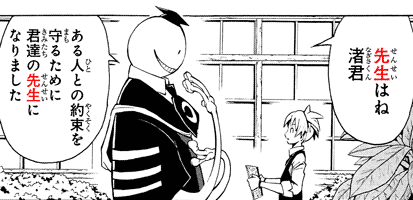
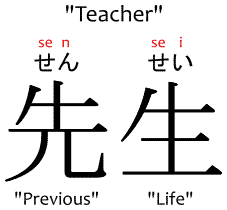
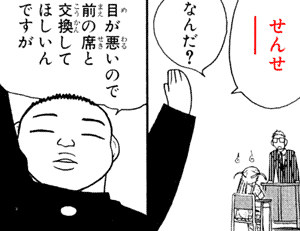
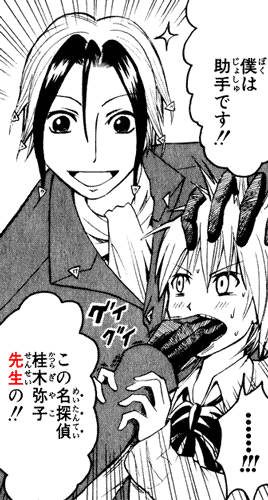
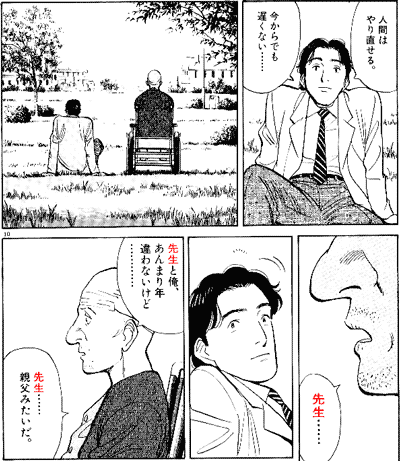
Thank you for teaching this -
ReplyDeleteHowever this is wrong in many cases where the "gakusei" is an illiterate adult and the "sensei" is a young child.
ReplyDeleteYeah, well, the origin of the word doesn't match how it's used in the modern world.
DeleteI have heard that sometimes the "dehati" people address each other as "sensei" even if the other person is a teacher or not
ReplyDelete